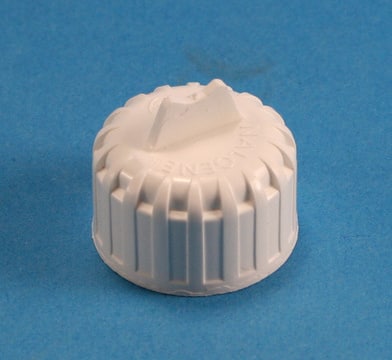T2418
Nalgene® centrifuge tubes, Oak Ridge Style 3114
capacity 50 mL, pack of 2 ea
Synonym(s):
High-Speed Centrifuge Tubes, Nalgene tubes
Sign Into View Organizational & Contract Pricing
All Photos(1)
About This Item
UNSPSC Code:
41121703
eCl@ss:
32119210
NACRES:
NB.11
Recommended Products
material
FEP
Tefzel® closure
round bottom tube
screw top cap
sterility
non-sterile
feature
RCF 50,000 × g with sealing cap assembly
packaging
pack of 2 ea
manufacturer/tradename
Nalgene® 3114-0050
capacity
50 mL
Looking for similar products? Visit Product Comparison Guide
General description
Nalgene® Oak ridge high-speed centrifuge tubes, made with PTFE®fluoropolymer and closure made with Tefzel®, are the perfect solution for conducting high-speed centrifugation of aggressive chemicals. These tubes are suitable for chloroform and phenol extractions.
Application
Nalgene® centrifuge tube, Oak Ridge Style 3114 is suitable for use in tagged protein purification.
Features and Benefits
- Withstands temperatures ranging from -100°C to +150°C (-148°F to +302°F).
- Leakproof closures help to prevent material loss for spins <10,000 × g.
- Handles up to 50,000 x g with Nalgene sealing cap assemblies.
- Proper performance requires filling to at least 100% total capacity.
- Autoclavable and provides biohazard protection when used with supplied Nalgene closure or PTFE FEP.
Other Notes
Proper performance can be achieved by filling to at least 100% of thetotal capacity.
Legal Information
Nalgene is a registered trademark of Thermo Fisher Scientific or its subsidiaries
Tefzel is a registered trademark of E. I. du Pont de Nemours and Company
Choose from one of the most recent versions:
Certificates of Analysis (COA)
Lot/Batch Number
Sorry, we don't have COAs for this product available online at this time.
If you need assistance, please contact Customer Support.
Already Own This Product?
Find documentation for the products that you have recently purchased in the Document Library.
Customers Also Viewed
Mark W Soo et al.
Bio-protocol, 11(18), e4168-e4168 (2021-10-26)
In the field of chromatin biology, a major goal of understanding the roles of histone post-translational modifications is to identify the proteins and domains that recognize these modifications. Synthetic histone peptides containing one or more modifications are a key tool
Our team of scientists has experience in all areas of research including Life Science, Material Science, Chemical Synthesis, Chromatography, Analytical and many others.
Contact Technical Service






